Introduction
Subscribe on Spotify | Google | Stitcher | TuneIn | Pandora | Apple Podcasts
Episode 4 of The Heist
In November 2017, The Wall Street Journal held its annual networking event for CEOs at the Four Seasons Hotel in Washington, D.C.
The Tax Cuts and Jobs Act had just been introduced in Congress. If passed, it would slash corporate income tax rates by 40 percent. The Trump administration promised those savings would trickle down into the economy in the form of jobs, higher wages and investment in the private sector, such as spending money on new buildings, factories and equipment.
Gary Cohn, the director of the White House’s National Economic Council and President Donald Trump’s chief economic adviser, was at the conference to reinforce that message.
Toward the end of his presentation, Cohn took questions from the audience. Wall Street Journal editor John Bussey grabbed the microphone and asked the CEOs, “If the tax reform bill goes through, do you plan to increase your company’s capital investment? Let’s see a show of hands.”
Among the dozens of corporate executives in attendance, only a few held up their hands.
“Ok, why aren’t the other hands up?” Cohn asked.
It was an awkward moment for Cohn. But Congress passed the tax bill, nevertheless.
In the years that followed, not only did the tax cuts not pay for themselves, as promised, they didn’t spur a lot of capital investment. It was a giveaway of hundreds of billions of dollars to corporations that will be paid for by future taxpayers.
Flying high
American Airlines Inc. serves as a good example of what corporations did with the windfall of money they received from the Tax Cuts and Jobs Act and how that exacerbated the economic fallout during the coronavirus pandemic.
In 2015, American came out of bankruptcy, leaving behind years of losses that followed the 9/11 terrorist attacks and the 2008 recession. Company spirits were high.
At a Halloween party in 2015, American Airline’s president at the time arrived riding a Harley Davidson, dressed up as Taylor Swift. A video of the party posted online showed CEO Doug Parker dressed up as Keith Richards from the Rolling Stones. Parker, wearing black eyeliner and a red bandana, took the stage. With other company executives, he performed the hit “I Can’t Get No Satisfaction.”
In the years that followed, nothing spoiled the party. The company continued raking in billions in profits. By 2017, American was flying more passengers than any airline in the world.
Parker was feeling bullish about the company’s future.
“Since the merger with U.S. Airways three years ago, we’ve been producing on average about $5 billion a year, pre-tax,” Parker told CNBC in 2017, “We think we have a business now that’s gonna be profitable in good and bad times.”
In December 2017, Trump signed the Tax Cuts and Jobs Act, giving companies like American a huge tax break. Within weeks, corporations started giving employee bonuses. American announced it would give all its workers a $1,000 bonus.
That was the first time American flight attendant Deborah Volpe heard of the tax cuts.
“If it’s a dollar I was never supposed to have, I’m grateful. I’m blessed,” Volpe said. But “where is the rest of this going? All we got was $1,000. … Show us how you’re putting it back into our company. And back for us, your frontline employees.”
Gary Peterson, an airframe and powerplant mechanic, who has worked for most of his 30 years in the airline industry and for American, thought the bonuses were small compared with what corporations received in tax savings.
“While we were getting this little baby infusion of money that might have helped put food on the table or maybe helped with rent for a month, Corporate America was reaping rewards that are hundreds upon hundreds of millions and could be into the billions,” Peterson said.
Peterson heard about the tax cuts through the Transport Workers Union of America, where he is the international vice president. He said he remembers Parker saying the airline will never lose money again and how the company spent hundreds of millions of dollars on a new headquarters in Fort Worth, Texas. The company also upgraded its first-class lounges. Nothing was being spent on employees, he said.
“We have workers in the airline industry that work for these companies, and they have to go and get welfare to put food on the table because their wages are still so low,” Peterson said.
Stock buybacks
The TWU was in contract negotiations with American for at least a year. Mechanics demanded raises, better benefits, more time off. But the major sticking point was the outsourcing of mechanic and fleet service jobs to countries such as Brazil, China and El Salvador.
Offshoring of work has been a common corporate practice since the 1980s. It helps airlines cut costs. But Republicans said the tax cuts would encourage companies to bring those jobs back to the United States.
“In theory, the tax breaks that came out was supposed to have this trickle-down effect to the frontline worker,” Peterson said. But “I didn’t see anybody coming out from the corporate side and saying, ‘Hey, we got all these tax breaks and we’re making a billion dollars a quarter. So, what we’re going to do for you is this.’ … In fact, it was quite the opposite. We were in a fight to try and gain wages.”
In January, after four years of fierce negotiations, the mechanic’s union agreed to a contract. It included better pay, more time off and a cap on American’s outsourcing maintenance work.
It was a big victory for the union, but, as Petersen pointed out, during those four years, American was neither saving money nor using the tax breaks to pay employees or invest in the company.
Instead, American used hundreds of millions of the money to buy back its shares, which means it purchases its own shares from the stock market. That reduces the number of outstanding shares, and it makes the price of the remaining shares go up.
Buying back shares with corporate money used to be considered illegal because it was thought of as stock manipulation. But in 1982, the Securities and Exchange Commission adopted a rule that allowed corporations to buy its stock. In 2018, U.S. corporations bought more than $1 trillion of their own stock.
According to the SEC filings, between 2014 and 2019, American spent nearly $12 billion on stock buybacks.
In 2015, Parker appeared on the CNBC program Mad Money. He said he was compensated in American stock because, “I don’t think there’s any chance that the stock is going to be nearly as volatile as it has been in the past. I think it’s a real currency, and I’m happy to be paid in it.”
Since he became CEO in 2013, Parker has taken in $150 million from selling his American stock. Last year, Parker made $12 million. That is 195 times more than the median salary for American employees.
The more buybacks American does, the more money its executives make by selling their own stock in the company.
American used much of its savings from the tax law to buy back more stock. It used debt to pay for new airplanes and buildings. And the company wasn’t saving for the unexpected, such as the effects from a pandemic.
It’s not like the possibility of a pandemic was something that corporations weren’t aware of. In 2006, when Parker was CEO of U.S. Airways and there was an avian flu outbreak, he shrugged off such risks. On C-SPAN, Parker was asked if he was worried about a pandemic reducing air travel and if the government should provide financing to the airlines if needed.
“If we got to something where people would not fly, … certainly we would need some help through that,” Parker said. “But I don’t think we’re heading into anything like that.”
COVID-19 hits
Flight attendant Volpe first heard about COVID-19 when she was on a layover in Paris in January. At the time, she remembers thinking that the airline industry had made it through the SARS flu outbreak in 2003 and the H1N1 flu in 2009.
She began to feel sick during a layover in London later the same month. Volpe said she could still work, so she continued to fly. Volpe doesn’t know if she had COVID-19 because tests weren’t readily available then. But she said she was angry at what she perceived as American’s lack of safety guidance and protocol. So far, Volpe said two fellow flight attendants have died from COVID-19.
By March, most international and domestic flights had been canceled. By April, the airline industry was operating at about 30 percent capacity, and American was losing $70 million a day. Employees were being offered early retirement and buyouts.
As the economic crisis unfolded in April, American sent a video of Parker to its customers.
“This week we were fortunate to receive payroll support from the U.S. Department of the Treasury,” he said in the video. “These funds will be used to support our team through the summer and into the fall, funding team member salaries and benefits and keeping American flying.”
The top four U.S. airlines had spent a combined $45 billion on buybacks during the previous five years. When the pandemic hit, they lobbied the federal government for a bailout of nearly the same amount — $50 billion — which the Treasury approved. American received nearly $11 billion in the form of grants and almost half of it in a loan to be finalized later this year — more than any other airline.
Those funds came with restrictions, such as prohibiting using the money on stock buybacks or dividends. Parker was asked on CNBC if the restrictions were “limiting.”
“If you find yourself in need of government assistance, I think it’s fair to say that until you’ve paid off the loans, you don’t have stock buybacks, you don’t do dividends, … you have restrictions on executive compensation,” Parker said. “We’re going to need to figure out ways around those. But those were fair things we were asked to do, but we are certainly not complaining about them.”
‘It was a disaster’
Even with billions of dollars in pandemic aid, as of this fall, American is still in financial trouble. The company is trying to raise more cash to pay off debts and avoid bankruptcy.
It didn’t help that American spent billions on buybacks and not on employees, said Arne Alsin, founder of investment management firm Worm Capital and who has been following American for more than a decade.
Investors and shareholders also lost because American’s stock has dropped dramatically during the pandemic. That hurts public school teachers, firemen and other public-sector workers whose pensions or retirement funds are invested in American.
“If they think buybacks are good for Texas teachers and teachers in California, executives come on out and explain why,” Alsin said. “I can tell you there is no benefit. There is not a single benefit that they can point to.”
Joseph Stiglitz, a Nobel prize winning economist and professor at Columbia University, said neither buybacks nor the tax reform law have been good for the economy.
“Investment did not increase,” Stiglitz said. “Almost a trillion dollars went to share buybacks. Wages increased a minuscule amount. … As an economist, I’d say it was a disaster.”
Peterson, the mechanic at American, said he was taught as a child “to save money for that rainy day, not spend every dollar that I made.”
American turned down the Center for Public Integrity’s request for an interview about the stock buybacks, but in an email the company said it spent more on capital investments and workers than it did on stock buybacks in recent years.
“No amount of a rainy day fund could have prepared American or any other airline for COVID-19 and the devastating impact it has had on demand for air travel,” the company wrote.
Stiglitz said American failed to prepare for such catastrophic events such as a pandemic. The airline and other companies could have used the revenue from the tax cuts law to create buffers to protect them.
“But instead, the money went right out the door, leaving the taxpayers now to pick up the tab for their lack of foresight,” Stiglitz said. “The tax bill didn’t really set up the country well. It was badly designed. If we had had a tax bill that would have led to more investment, the consequences of putting the economy in stay for two, three months … in this position of hold, we would have been a lot better off.”
American announced this month it would furlough about 20,000 employees. It said that could be reversed if Congress is able to agree on a new aid package.
Trump tweeted this week urging Congress to act quickly to pass additional aid for airlines: “The House & Senate should IMMEDIATELY Approve 25 Billion Dollars for Airline Payroll Support.”
In the meantime, Volpe said her seniority may protect her from the layoffs, but she said she worries about her co-workers.
“Some people were looking to retire in the next year or two,” Volpe said. “That’s not going to happen if their 401Ks or their retirement is not where it needs to be.”
In a letter to employees, Parker wrote, “I am extremely sorry we have reached this outcome. It is not what you all deserve.”
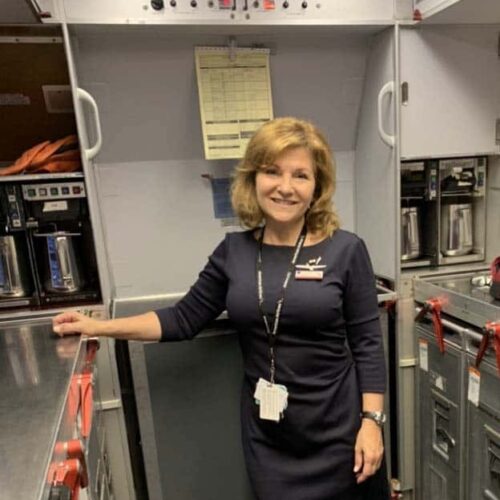

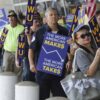
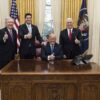
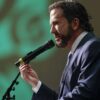
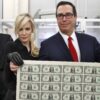
Join the conversation
Show Comments